Egypt
Things to Do in Cairo
Discover ancient wonders and vibrant markets in Cairo, where history and culture collide in a mesmerizing blend.

In Cairo, immerse yourself in history by exploring the Pyramids of Giza, a tribute to ancient Egyptian ingenuity on the Giza Plateau. Allocate at least 3 hours to marvel at the Great Pyramid. Explore Egypt's past at the Egyptian Museum in Tahrir Square, housing over 120,000 artifacts, including King Tutankhamun's treasures. Experience cultural richness by venturing through Khan El-Khalili Market's vibrant bazaar, dating back to the 14th century. For panoramic views, visit Salah El Din Citadel atop Mokattam hills, featuring the iconic Mosque of Muhammad Ali. These are just a few highlights awaiting your exploration in Cairo.
Key Takeaways
- Explore the Pyramids of Giza on Giza Plateau for a tribute to ancient Egyptian ingenuity.
- Visit the Egyptian Museum in Tahrir Square to see over 120,000 artifacts, including King Tutankhamun's treasures.
- Discover Salah El Din Citadel atop Mokattam hills with its historic fortress and Mosque of Muhammad Ali.
- Immerse in the vibrant atmosphere of Khan El-Khalili Market for traditional crafts, spices, and street food.
- Experience the cultural richness of Islamic Cairo, Coptic Cairo, and iconic landmarks like the Mosque of Muhammad Ali.
Explore the Pyramids of Giza
To fully experience Cairo, you must explore the mesmerizing Pyramids of Giza located on the Giza Plateau just southwest of the city. These ancient structures, including the Great Pyramid, stand as a tribute to the ingenuity of the ancient Egyptians.
When you visit the Pyramids of Giza, allocate at least three hours to fully immerse yourself in their grandeur. The entrance fees vary depending on which pyramids within the complex you choose to explore.
Once inside, you can marvel at the panoramic views of the pyramids and the iconic Great Sphinx nearby. Remember to tread carefully through this historical site, as each stone holds centuries of stories waiting to be discovered.
This adventure won't only offer you a glimpse into the past but also leave you in awe of the architectural marvels that have stood the test of time.
Wander Through Khan El-Khalili Market

Explore the vibrant Khan El-Khalili Market in Islamic Cairo, a historic bazaar dating back to the 14th century. This bustling market is a treasure trove of traditional crafts, spices, jewelry, and souvenirs that offer a glimpse into the rich local culture of Egypt. Immerse yourself in the lively atmosphere as you wander through narrow alleys adorned with colorful displays of Egyptian artifacts and handcrafted items. Don't miss the chance to haggle with vendors for unique finds and traditional clothing that make for perfect souvenirs.
To enhance your experience at Khan El-Khalili Market, make sure to indulge in the diverse street food offerings and savor a cup of tea at a local cafe while taking in the hustle and bustle around you. This market truly encapsulates the essence of Egyptian charm and provides a gateway to the country's vibrant heritage.
| Top Picks at Khan El-Khalili Market | |
|---|---|
| Traditional Crafts | Egyptian Artifacts |
| Spices | Jewelry |
| Souvenirs | Street Food |
Discover Islamic Cairo's Charm
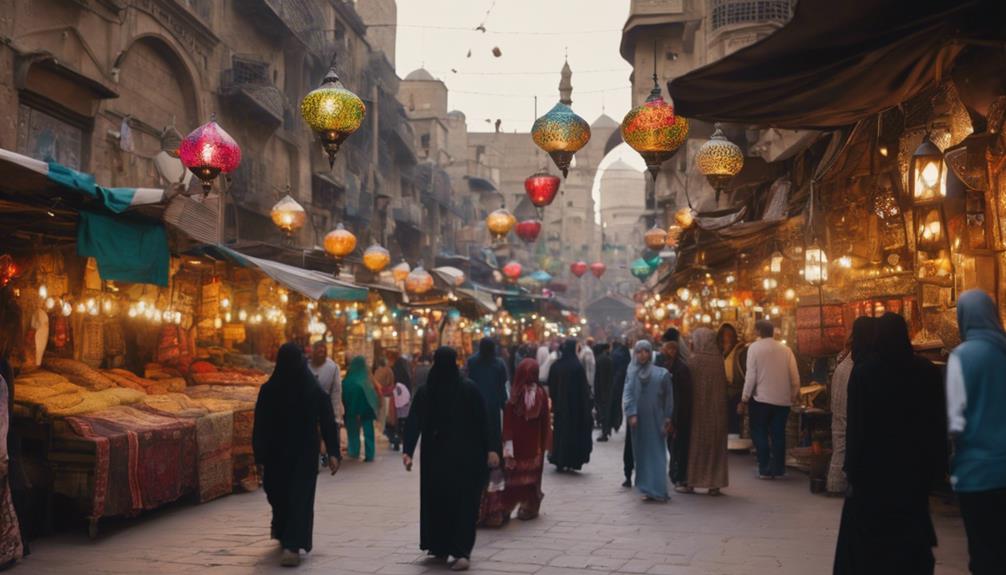
When exploring Islamic Cairo, you can begin a historic mosque tour that reveals the intricate beauty of Islamic architecture dating back centuries.
Immerse yourself in the rich cultural heritage of the district as you wander through local markets, like the vibrant Khan el-Khalili Market, offering traditional crafts and souvenirs.
This experience provides a glimpse into the charm and history of Islamic Cairo, making it a must-visit destination for those seeking a deeper understanding of Egypt's cultural tapestry.
Historic Mosque Tour
Discover the enchanting charm of Islamic Cairo by undertaking a fascinating Historic Mosque Tour. Begin your journey by exploring the Mosque-Madrassa of Sultan Hassan, a monumental structure that has stood for over 700 years, showcasing the architectural beauty and historical significance of Islamic Cairo.
Visit the Al-Rifai Mosque, renowned for its stunning architecture and rich cultural history, offering a glimpse into Egypt's religious past. Immerse yourself in the historical significance of the Mosque of Ahmed ibn Tulun, a prominent landmark in Islamic Cairo that reflects the deep-rooted religious history of the region.
Explore the cultural and architectural beauty of Al-Azhar Mosque, surrounded by the world's oldest university, symbolizing a unique blend of history and spirituality. To conclude, experience the enduring allure of the Mosque and Madrasa of Sultan Hassan, a significant site that encapsulates the essence of Islamic Cairo's charm through its rich heritage and architectural grandeur.
Local Market Exploration
Immerse yourself in the vibrant heritage of Islamic Cairo by delving into the local market exploration at Khan el-Khalili Market. As one of the oldest bazaars in the Middle East, this market located in Islamic Cairo is a treasure trove of traditional crafts, including exquisite jewelry, aromatic spices, intricate textiles, and other Egyptian gifts. Khan el-Khalili offers a unique opportunity to hone your haggling skills while discovering the rich cultural tapestry of Cairo through its bustling alleys.
Wander through the narrow pathways adorned with shops exuding the charm of ancient times. Engage with local vendors to find that perfect souvenir, whether it be a handcrafted carpet, ornate metalwork, or traditional attire.
After a day of exploration, take a moment to savor a cup of traditional Egyptian coffee or tea at a quaint local cafe, immersing yourself in the authentic sights and sounds of this historic market. Khan el-Khalili is a must-visit destination for anyone seeking to experience the enchanting allure of Cairo's local markets.
Visit the Egyptian Museum

Make sure to add the Egyptian Museum to your Cairo itinerary for a fascinating journey through ancient history and culture. Located in Tahrir Square, the Egyptian Museum houses an impressive collection of over 120,000 artifacts, offering a glimpse into Egypt's rich past. Among its treasures are the famous artifacts of King Tutankhamun, including his iconic golden mask. History enthusiasts will be captivated by the museum's diverse exhibits, which range from mummies and statues to ancient relics that date back thousands of years.
Visitors can explore the museum's extensive galleries, such as the Royal Mummy Room, where well-preserved mummies of pharaohs like Ramses II are on display, and the Tutankhamun Galleries, showcasing the treasures found in the young king's tomb.
The Egyptian Museum provides a thorough overview of Egypt's history and is a must-visit for anyone interested in ancient Egyptian civilization.
Experience Coptic Cairo's History
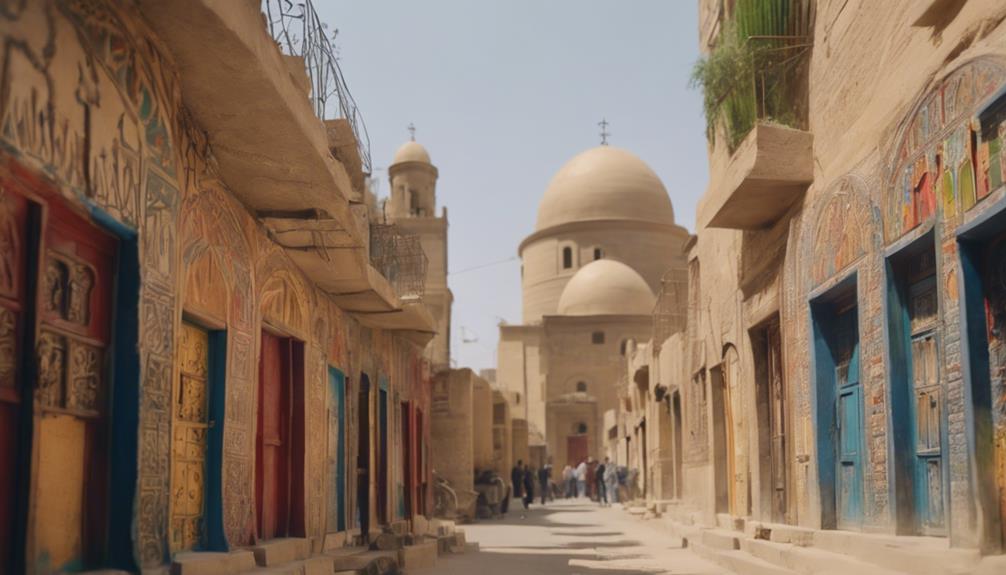
Embark on a journey through the historical heart of the Coptic Christian community by exploring Coptic Cairo's rich tapestry of original churches, a mosque, and a synagogue. Coptic Cairo encapsulates the cultural diversity and historical charm of Egypt, offering a unique insight into the religious history of the region.
The area boasts the iconic Hanging Church, dating back to the 4th century AD, which is elevated above two Roman gate towers, symbolizing the enduring presence of Christianity.
Explore further into Egypt's religious tapestry by visiting the Mosque and Madrasa of Sultan Hassan, showcasing stunning Islamic architecture and providing a glimpse into the country's Islamic heritage.
Coptic Cairo stands as a declaration to the peaceful coexistence of different faiths, with its proximity to the Mosque of Sultan Hassan highlighting the harmonious blend of cultures within the neighborhood. This harmonious mix of landmarks truly embodies the spirit of unity and tolerance that has characterized Egypt's history for centuries.
Marvel at Salah El Din Citadel

The Salah El Din Citadel, a monumental fortress atop the Mokattam hills in central Cairo, offers a fascinating glimpse into the city's rich history and architectural splendor. The Citadel, also known as the Citadel of Saladin, served as the seat of government in Cairo for many centuries. One of its prominent features is the Mosque of Muhammad Ali, also called the Alabaster Mosque, constructed in the elegant Ottoman style. Visitors can marvel at the breathtaking panoramic views of Cairo from the Gawhara Terrace, a spot that never fails to captivate tourists. Designated as a UNESCO World Heritage Site since 1976, the Citadel stands as a significant historic and architectural landmark in Cairo. Situated on the picturesque Mokattam hills, the Salah El Din Citadel is a must-visit destination for enthusiasts of history and culture.
| Keywords | Description |
|---|---|
| Salah El Din Citadel | Monumental fortress with rich history and architectural splendor on Mokattam hills in Cairo |
| Mosque of Muhammad Ali | Ottoman-style mosque also known as Alabaster Mosque |
| Gawhara Terrace | Offers breathtaking panoramic views of Cairo, a popular spot for tourists |
| UNESCO World Heritage Site | Recognized in 1976 for its historical and architectural significance, a must-visit landmark |
Frequently Asked Questions
Is 3 Days Enough in Cairo?
Three days in Cairo can provide a rich experience, allowing you to explore key attractions and immerse yourself in the city's culture.
By efficiently planning your itinerary and possibly considering guided tours to maximize your time, you can enjoy a well-rounded visit.
While more time would offer a deeper exploration into Cairo's offerings, three days offer a balanced mix of sightseeing, cultural immersion, and relaxation for a thorough city experience.
Is It Safe to Walk Around Cairo as a Tourist?
When walking around Cairo as a tourist, you'll find that safety can be a relative concept. While the city has its risks, sticking to well-traveled areas during daylight and avoiding conspicuous displays of wealth can enhance your security.
Being aware of your surroundings and respecting local customs can contribute to a positive experience. Hiring a local guide may provide valuable insights and added safety measures during your explorations.
What Do Tourists Typically Do When Visiting Cairo Egypt?
When visiting Cairo, tourists typically explore iconic sites like the Pyramids of Giza, the Egyptian Museum, and Khan Al-Khalili bazaar.
They also visit the Salah El Din Citadel for panoramic views and the Mosque of Muhammad Ali.
Islamic Cairo offers historic streets, Islamic architecture, and landmarks like Al-Azhar Mosque.
These experiences showcase Cairo's rich history and cultural heritage, providing a diverse and immersive travel experience.
What Is Cairo Most Famous For?
Cairo is most famous for the iconic Pyramids of Giza, especially the Great Pyramid, one of the Seven Wonders of the Ancient World. This historical wonder draws millions of visitors annually, contributing substantially to Egypt's tourism sector.
The pyramids stand as a proof to the ancient civilization's architectural prowess and cultural significance, making Cairo an essential destination for history enthusiasts and travelers seeking a glimpse into the past.
Conclusion
To wrap up, Cairo offers a rich tapestry of history, culture, and wonders waiting to be explored. From the ancient Pyramids of Giza to the bustling Khan El-Khalili Market, there's something for everyone in this vibrant city.
So, pack your bags and set off on a journey through time and tradition in Cairo. As the saying goes, 'Traveling – it leaves you speechless, then turns you into a storyteller.' And Cairo is sure to leave you with unforgettable stories to tell.
Egypt
Egypt's Ancient Wonders and Vibrant Cities
Observe the magic of Egypt's ancient wonders and vibrant cities, where history meets modernity in a captivating journey.

In Egypt, ancient wonders and vibrant cities await. Cairo beckons with the Egyptian Museum and intricate Citadel. Luxor mesmerizes with the Luxor Temple and Karnak's grandeur. Aswan's Philae Temple and tranquil Nile entice with history. Along the Nile, witness the awe of Abu Simbel. Discover the magnificence of temples and tombs, like the Valley of the Kings or the Great Sphinx. Alexandria's coastal charm and Bibliotheca Alexandrina add allure. For seaside bliss, Sharm El Sheikh's coral reefs and luxury resorts await. The blend of historical marvels and modern cities in Egypt is a journey worth undertaking.
Key Takeaways
- Cairo seamlessly blends ancient and modern influences, showcasing Egypt's rich history.
- Luxor boasts impressive ancient structures like Luxor Temple and Karnak Temple.
- Aswan's tranquil Nile River and iconic temples like Philae and Abu Simbel offer historical allure.
- Alexandria's maritime history reflected in its fortress and Bibliotheca Alexandrina.
- Sharm El Sheikh, a coastal gem, offers crystal-clear waters, vibrant coral reefs, and a lively nightlife.
Cairo: The Vibrant Capital
In Cairo, the vibrant capital of Egypt, immerse yourself in a bustling city teeming with iconic landmarks and rich history.
The Egyptian Museum stands as a treasure trove of artifacts, including the renowned treasures of King Tutankhamun, offering you a glimpse into the ancient wonders of this historic city.
As you wander through Cairo's maze of streets, you'll encounter historic mosques like those within the Citadel of Cairo, showcasing the city's Islamic heritage through their intricate architecture.
Don't miss the vibrant experience of exploring Khan El Khalili Bazaar, a bustling marketplace filled with traditional crafts, spices, and unique souvenirs that reflect Cairo's cultural richness.
This dynamic city seamlessly blends its ancient past with modern amenities, solidifying its position as a cultural hub that invites you to explore its depths and uncover the layers of history that have shaped Cairo into the mesmerizing metropolis it's today.
Luxor: City of Historical Marvels
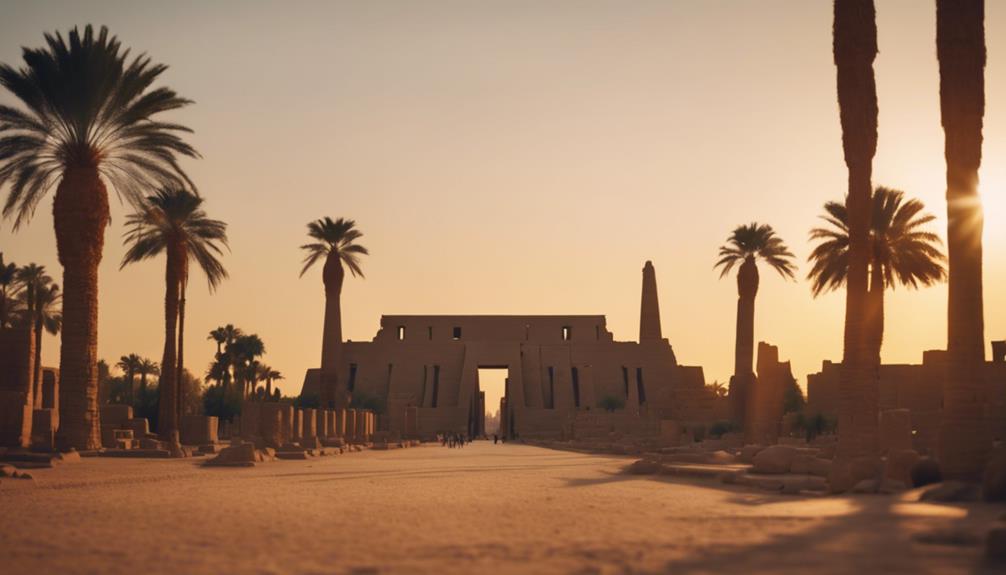
Luxor, a city steeped in historical marvels, showcases an array of ancient treasures and architectural wonders waiting to be explored.
Luxor, known as the world's greatest open-air museum, is home to iconic sites like the Luxor Temple and Karnak Temple. The Luxor Temple, constructed by Amenhotep III and expanded by Ramesses II, stands as a tribute to ancient Egyptian craftsmanship and religious devotion.
Karnak Temple, the largest ancient religious site globally, is dedicated to the revered god Amun and leaves visitors in awe of its grandeur. As you stroll down the Avenue of Sphinxes, spanning over 1.5 miles, you're transported back in time to witness the majestic entrance to the Karnak Temple.
Luxor's historical sites offer a fascinating insight into ancient Egyptian rituals, ceremonies, and architectural feats that continue to captivate visitors from around the world.
Aswan: Serene Riverside City
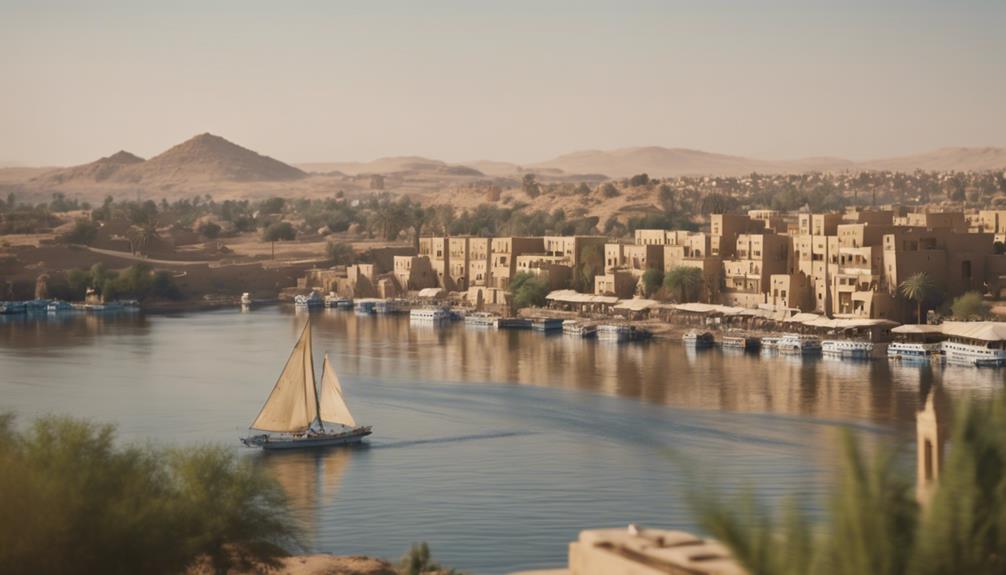
As you wander the serene city of Aswan along the beautiful Nile River, you'll encounter ancient wonders that tell stories of a bygone era.
The Philae Temple, dedicated to the goddess Isis, invites you to take a scenic boat trip to unravel its mysteries.
Immerse yourself in the history of ancient Egyptian construction techniques at the Unfinished Obelisk, offering a glimpse into the ingenuity of the past.
Nile River's Beauty
Nestled along the tranquil banks of the Nile River, Aswan beckons with its serene ambiance and picturesque riverside charm. The city's allure lies not only in its historical sites but also in the natural beauty that surrounds it. Here's why the Nile River's beauty in Aswan is truly mesmerizing:
- Philae Temple: Accessible by a scenic boat trip, Philae Temple stands as a proof of exquisite ancient Egyptian architecture, offering visitors a glimpse into the grandeur of the past.
- Unfinished Obelisk: The Unfinished Obelisk in Aswan is a remarkable site that provides a fascinating insight into the ancient quarrying techniques employed by the Egyptians, showcasing their precision and craftsmanship.
- Abu Simbel Temples: Serving as a gateway to the iconic Abu Simbel Temples, Aswan allows travelers to marvel at the impressive rock-cut architecture of these historic temples, further enhancing the allure of the city's riverside beauty.
Aswan's serenity and natural splendor make it a perfect destination for those seeking a tranquil and rejuvenating experience along the majestic Nile River.
Temples and Tombs
Immerse yourself in the ancient allure of Aswan's serene riverside city, where temples and tombs whisper tales of a bygone era waiting to be discovered.
Aswan, a peaceful city in Egypt, boasts a rich history intertwined with ancient Egyptian religious sites and burial grounds. The Philae Temple, dedicated to the goddess Isis, stands as a proof of the incredible architectural prowess of the ancient world. Accessible by a scenic boat trip on the Nile River, this temple complex offers a glimpse into the spiritual practices of the past.
For those seeking a deeper connection to ancient Egyptian history, Aswan serves as a gateway to the Valley of the Kings, a burial ground dating back to the 16th century BC. Here, pharaohs and nobles were laid to rest in elaborate tombs adorned with intricate hieroglyphics and valuable treasures.
The Great Sphinx, a majestic symbol of ancient Egypt, also beckons visitors to explore its mysteries and marvel at its grandeur. Aswan's temples and tombs stand as silent witnesses to a civilization that thrived in the heart of the desert, leaving behind a legacy that continues to captivate the modern world.
Giza: Home of the Pyramids
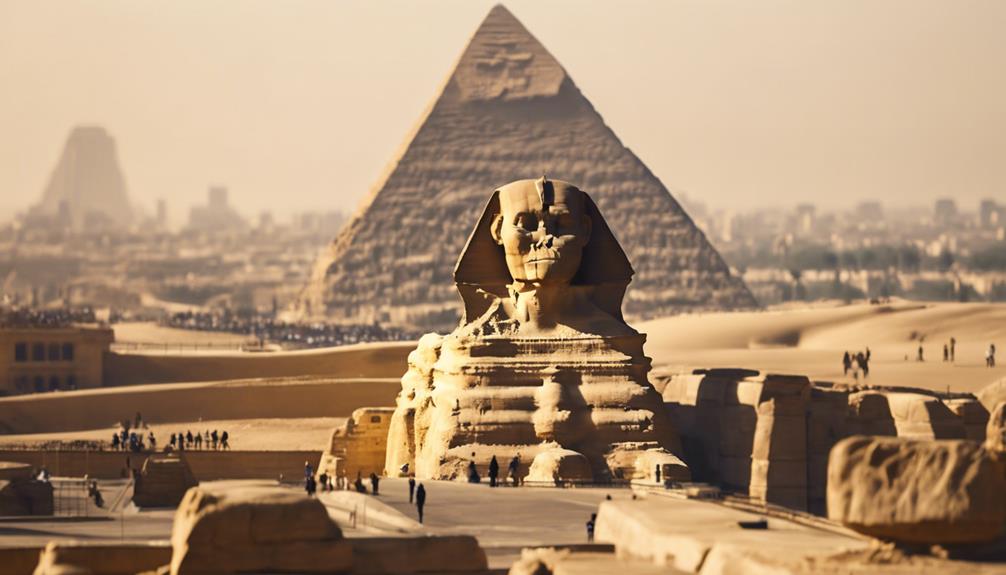
Giza, home to the famed Pyramids of Giza, showcases remarkable pyramid construction techniques that continue to intrigue historians and archaeologists.
Modern-day preservation efforts aim to safeguard these ancient wonders for future generations, ensuring that the legacy of ancient Egypt endures.
Explore Giza to witness the seamless blend of history and innovation, where the mysteries of the past meet the advancements of the present.
Pyramid Construction Techniques
The construction of the Great Pyramid of Giza involved the use of innovative techniques such as ramps, levers, and sledges to transport and position over 2.3 million blocks of limestone and granite.
- Efficient Transport Methods: Ancient Egyptians utilized sledges to move heavy stone blocks across the construction site, minimizing the effort required by workers.
- Precision in Positioning: The careful use of levers allowed workers to lift and precisely place massive stones, ensuring minimal gaps between the blocks.
- Astronomical Alignment: The alignment of the pyramids with the cardinal points demonstrates the advanced astronomical knowledge possessed by the ancient Egyptians.
The ancient Egyptians' mastery of these pyramid construction techniques enabled them to create monumental structures that have stood the test of time, showcasing their engineering prowess and deep understanding of the cosmos.
Additionally, the original polished limestone casing stones of the Great Pyramid added to its grandeur, reflecting sunlight and creating a dazzling effect that must have captivated onlookers in ancient times.
Modern Day Preservation Efforts
Preservation efforts at Giza, home of the Pyramids, play an essential role in safeguarding the historical significance of these ancient structures. Conservation teams diligently undertake restoration projects to stabilize the Pyramids of Giza against the erosive forces of nature and human interference. By employing advanced technology, such as monitoring systems and non-invasive techniques, these teams guarantee the structural integrity of these iconic monuments is maintained.
In parallel, sustainable tourism practices are implemented at Giza to minimize the environmental impact of visitors while enhancing their experience. Educational programs are also vital components of preservation efforts, aiming to raise awareness about the importance of protecting these ancient wonders for future generations.
Through these initiatives, the Pyramids of Giza aren't only preserved but also promoted as sites of cultural and historical significance, fostering a deeper appreciation for their enduring legacy.
Alexandria: Coastal Cultural Gem
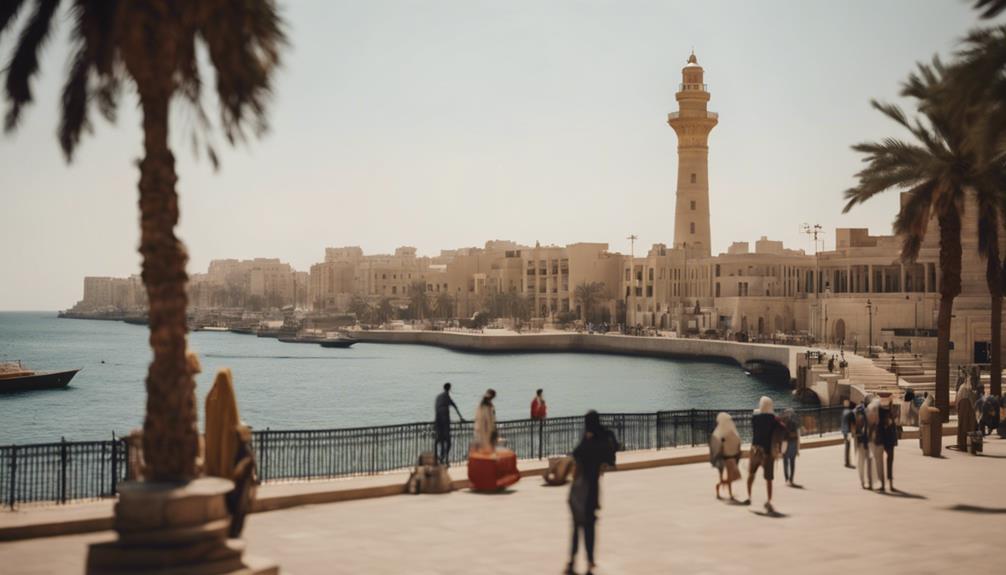
Nestled along the Mediterranean coast, Alexandria shines as a vibrant hub of culture and history in Egypt. The city's coastal location has played a significant role in shaping its identity as a cultural gem. Here are some notable highlights that make Alexandria a must-visit destination:
- The Citadel of Qaitbay: This ancient fortress stands proudly on the Mediterranean shores, offering panoramic views of the sea. Built in the 15th century, it's a testament to Alexandria's rich maritime history.
- Library of Alexandria: Reviving the spirit of the ancient Library of Alexandria, the modern Bibliotheca Alexandrina is a symbol of knowledge and learning. Visitors can explore its vast collection of books, manuscripts, and exhibitions that pay homage to the city's scholarly past.
- Cultural Landmarks: From Pompey's Pillar to the Catacombs of Kom el Shoqafa, Alexandria is dotted with historical treasures that showcase its diverse heritage. These sites provide a glimpse into the city's illustrious past and cultural significance.
Sharm El Sheikh: Seaside Paradise

Glistening with allure, Sharm El Sheikh beckons as a seaside paradise on Egypt's southern coastline. This popular resort town, located on the southern tip of the Sinai Peninsula, is renowned for its crystal-clear waters and vibrant coral reefs, making it a haven for diving and snorkeling enthusiasts. The Red Sea, with its rich marine life, provides an unparalleled underwater experience for visitors.
Sharm El Sheikh boasts a plethora of luxury resorts offering excellent amenities, making it a sought-after destination for those craving a blend of relaxation and indulgence. The warm climate and stunning beaches further enhance its appeal, attracting sun-seekers and water sports enthusiasts alike.
In addition to its natural beauty, the town offers a vibrant nightlife scene, catering to visitors seeking entertainment against the backdrop of a picturesque coastal setting.
With a variety of restaurants and shopping opportunities, Sharm El Sheikh provides a well-rounded vacation experience, appealing to a diverse range of travelers looking to unwind in a paradisiacal environment.
Frequently Asked Questions
What Are the Wonders of Ancient Egypt?
In ancient Egypt, the wonders that captivate are:
- The Great Pyramid of Giza, the monumental creation of Pharaoh Khufu.
- The enigmatic Great Sphinx, thought to symbolize King Khafra.
- The majestic Temple of Luxor, a tribute to the Theban Triad by Amenhotep III and Ramesses II.
- The awe-inspiring Abu Simbel rock temples erected under Pharaoh Ramesses II's rule.
These iconic structures showcase the grandeur and architectural prowess of ancient Egyptian civilization.
Which of the 7 Wonders Are in Egypt?
You might be surprised, but none of the Seven Wonders of the Ancient World are actually located in Egypt.
The Great Pyramid of Giza and the Great Sphinx are indeed iconic landmarks in Egypt, but the only Wonder that was situated in this country is the Great Lighthouse of Alexandria, which no longer stands.
The other wonders were spread across different regions, showcasing the architectural prowess of various ancient civilizations.
What Is the Ancient City in Egypt?
The ancient city in Egypt is Luxor, once known as Thebes. It served as the capital of Egypt during the New Kingdom period, boasting remarkable temples like Luxor Temple and Karnak Temple.
Luxor is a hub of archaeological sites, including the Valley of the Kings and the Mortuary Temple of Hatshepsut. This city played a significant role in ancient Egypt, housing structures dedicated to both gods and rulers.
Luxor's history and monuments make it a prime destination for enthusiasts of ancient civilizations.
What Was the Richest and Most Vibrant Period in Ancient Egyptian History?
The New Kingdom period, approximately from 1550 to 1070 BC, stands as the richest and most vibrant era in ancient Egyptian history. Characterized by significant military conquests, trade expansion, and cultural flourishing, this period saw remarkable pharaohs like Hatshepsut, Thutmose III, and Ramesses II.
Luxor and Thebes emerged as major centers of power and culture, showcasing the grandeur and wealth of this prosperous time. Amenhotep III and Akhenaten's reign also brought artistic and religious innovations, making it a dynamic period in Egyptian history.
Conclusion
To sum up, Egypt offers a rich tapestry of ancient wonders and vibrant cities waiting to be explored. From the bustling streets of Cairo to the tranquil banks of the Nile in Aswan, each destination offers a unique and unforgettable experience.
Whether you're marveling at the pyramids in Giza or relaxing on the beaches of Sharm El Sheikh, Egypt's diverse attractions are sure to captivate and inspire you. Don't miss the opportunity to discover the beauty and history of this fascinating country.
-

 Texas5 months ago
Texas5 months agoWaco's Historic Sites and Texas Comfort Food
-

 Michigan5 months ago
Michigan5 months agoStellantis Leadership Team: Guiding Global Auto Giants
-

 Colombia5 months ago
Colombia5 months agoThings to Do in Cartagena
-

 Florida5 months ago
Florida5 months agoHistoric St. Augustine's Spanish Charms
-

 Alaska5 months ago
Alaska5 months agoThings to Do in Ketchikan Alaska
-

 District of Columbia5 months ago
District of Columbia5 months agoIconic Experiences in the Nation's Capital
-

 Colombia5 months ago
Colombia5 months agoBogotá Fuses Colombia's Past and Vibrant Present
-

 Video Game5 months ago
Video Game5 months agoThings to Do in Minecraft















